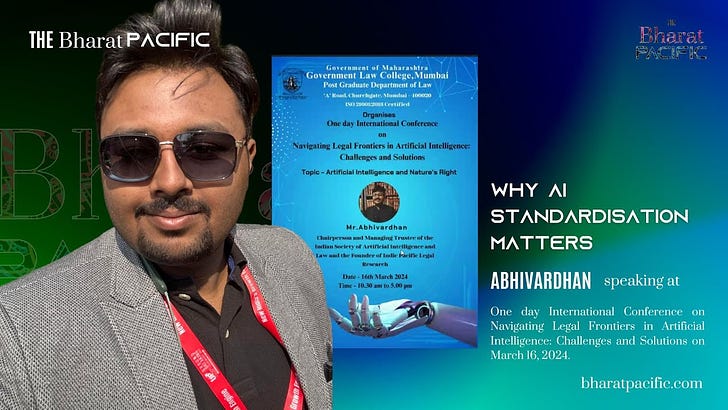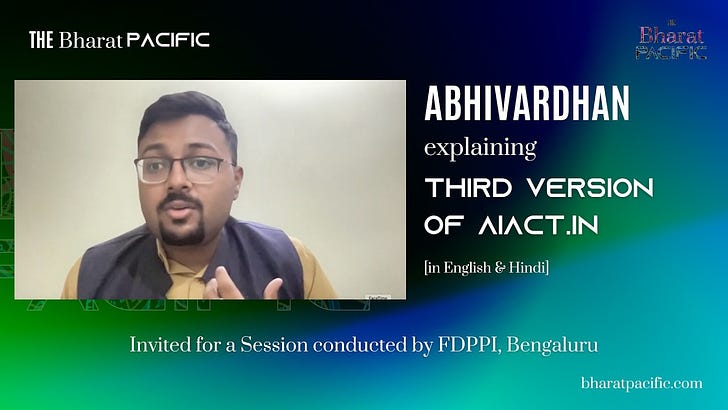Are you curious about the future of India's digital competition landscape? Look no further than the insightful feedback report on the Draft Digital Competition Bill, 2024 by Indic Pacific Legal Research.
Find the complete feedback report here.
This comprehensive analysis not only breaks down the key provisions of the proposed legislation but also highlights how India is forging its own path in regulating digital markets, drawing inspiration from global best practices while tailoring them to the unique Indian context.Here are some compelling reasons why this feedback report is a must-read for anyone interested in the intersection of technology, law, and policy:
Understand the nuances of India's approach: While the Digital Competition Bill shares some similarities with the EU's Digital Markets Act (DMA), it is far from a mere copy-paste job. The report delves into the distinct features of the Indian bill, such as the criteria for designating Systemically Significant Digital Enterprises (SSDEs) and the exemptions available to them, showcasing how India is adapting global principles to suit its specific needs.
Gain insights into the stakeholder perspectives: The report provides a fascinating glimpse into the diverse viewpoints of various stakeholders, from tech giants to industry associations, on the proposed ex-ante regulations. By understanding the points of convergence and divergence among these stakeholders, you can better appreciate the challenges and opportunities in crafting a balanced digital competition framework.
Explore the interplay with other laws: The feedback report doesn't just focus on the Digital Competition Bill in isolation but also examines its interaction with other key legislations such as the Digital Personal Data Protection Act (DPDPA) and the upcoming Digital India Act. This holistic analysis helps you grasp the broader regulatory landscape shaping India's digital economy.
Discover the potential impact on innovation: One of the most intriguing aspects covered in the report is the delicate balance between fostering competition and nurturing innovation. The authors offer thoughtful recommendations on how the bill can be fine-tuned to ensure that it doesn't stifle the growth of startups and emerging technologies while still keeping the digital giants in check.
Peek into the future of AI regulation: In a forward-looking move, the report also draws upon the draft Artificial Intelligence (Development & Regulation) Act, 2023 (AIACT.IN V2) to suggest how the Digital Competition Bill can incorporate AI-specific provisions related to interoperability, algorithmic transparency, and IP protections. This futuristic perspective makes the report a valuable resource for anyone keen on staying ahead of the curve.
In short, the feedback report by Indic Pacific Legal Research is not just an academic exercise but a practical guide to navigating the complex terrain of digital competition law in India.
By offering a nuanced analysis of the Draft Digital Competition Bill and its global counterparts, the report empowers policymakers, legal professionals, and tech enthusiasts alike to engage in informed discussions and shape the future of India's digital landscape.
So, don't miss out on this opportunity to dive deep into the world of digital competition law and discover how India is charting its own course in the global regulatory arena. Get your hands on the feedback report today and join the conversation on building a fair, innovative, and inclusive digital economy for all.
How Generative AI Manufactures your Consent
This is a post authored by Mr Abhivardhan, our Chairperson. The original post can read here.
Draft Digital Competition Bill, 2024 for India: Feedback Report [IPLR-IG-003]
The Indian Society of Artificial Intelligence and Law (ISAIL) is thrilled to announce the publication of IPLR-IG-003, a comprehensive Feedback Report on the Draft Digital Competition Bill, 2024 published and developed by Indic Pacific Legal Research under the leadership of Mr
Why is AI Standardisation Needed? | Abhivardhan @GLC Mumbai
We are pleased to announce our Chairperson, Abhivardhan's participation as a Keynote Speaker in the inaugural session of the One-Day International Conference on Navigating Legal Frontiers in Artificial Intelligence: Challenges and Solutions, which took place on





![Draft Digital Competition Bill, 2024 for India: Feedback Report [IPLR-IG-003]](https://substackcdn.com/image/fetch/$s_!9QG_!,w_1300,h_650,c_fill,f_auto,q_auto:good,fl_progressive:steep,g_auto/https%3A%2F%2Fsubstack-post-media.s3.amazonaws.com%2Fpublic%2Fimages%2F8a24a6bf-9aa5-4c96-9769-11c52d03bd36_623x442.gif)









Share this post